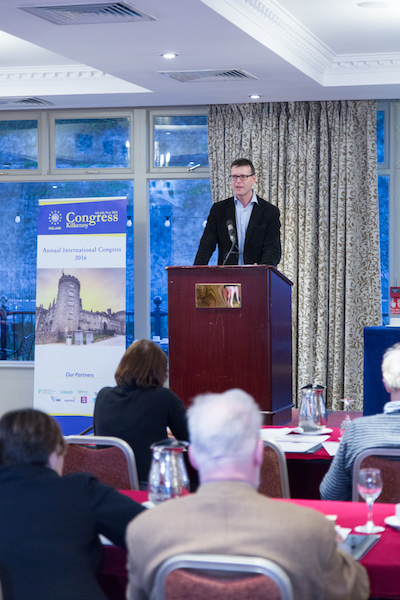Members hear of huge potential for Irish food and drinks exports
February’s AEJ lunch was kindly sponsored by An Bord Bia and members heard a very stimulating presentation from CEO Aidan Cotter.
He began by asking two key issues which are critical to Ireland’s food industry:
1) How to feed the world and
2) How to live with climate change
There is a major dilemma in satisfying both of these issues together and these are the biggest challenges facing the Irish food industry in coming years.
Global food commodity prices are now 35% higher than in 2005, he said and it looks like high food prices may be here to stay. This is basically due to the fact that the global population is growing at a rate of 80 million people per year. By 2050 there will be 9 billion people in the world.
Half the world’s population now live in cities and there is very much a change in dietary habits from starch to protein and other foods which suits the Irish climate. Over the next 20 years there will be an extra three billion consumers mainly in China and India. Africa is also featuring with an extra one billion people there in the same period.
On the negative side, climate change and freak weather conditions are a major challenge. The most significant factor causing volatility is weather conditions.
Agriculture currently uses 70 pc of the world’s freshwater but by 2025 up to two-thirds of the global population could be living under water-stress conditions.
On the domestic front Irish food prices are now just 5 pc higher than 7 yrs ago compared to much more significant rises in the UK and Europe. The reason for this is the economic downturn which has also kept prices down.
But food and drink exports rose by 12 pc in 2011 to a record 8.85bn. Meat and livestock account for two-thirds of exports. There was a 20 pc increase in international markets compared to 6 pc in UK and 16 pc in other EU markets.
Over Mr Cotter said there is an atmosphere of optimism and confidence in the industry. Bord Bia is very confident, too, working with just a total full-time staff of 89 people spread over 10 international offices.
He quoted a recent Harvard report which said Ireland is in an enviable agricultural situation. It has an abundant fertile land, lots of water, and miles of coastline all close to 400m affluent people.
Mr Cotter thanks the AEJ for coming to lunch and congratulated Eileen Dunne on being only the second Irish person ever to be elected International President.
Irish chair Dr Martin Alioth thank Mr Cotter and An Bord Bia for their hospitality and said there was much food for thought – literally – in the presentation.

